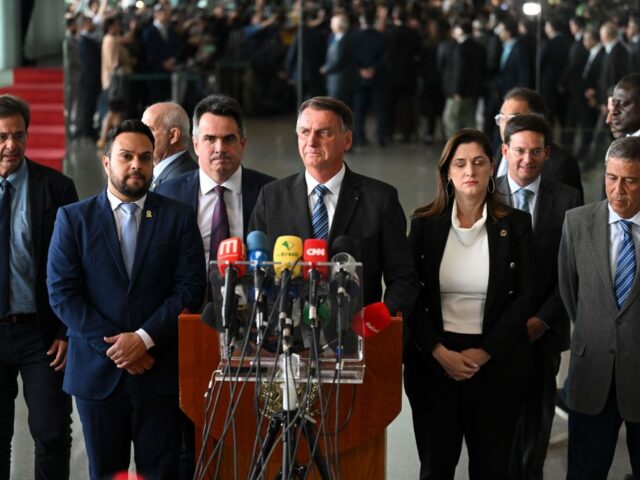Brazilian President Jair Bolsonaro delivered brief comments on Tuesday – keeping the media waiting for over an hour – addressing growing protests against the election of convicted felon Luiz Inácio Lula da Silva to the presidency but failing to address his loss on Sunday.
The socialist Lula – who served two terms as president from 2003 to 2011 and was convicted in 2017 of taking bribes while in the nation’s highest office – won the 2022 presidential election on Sunday by one of the slimmest margin’s in history. Lula was allowed to run for the presidency despite being a convicted criminal because the nation’s top court, the Supreme Federal Tribunal (STF), overturned the conviction on procedural grounds. The STF never presented any evidence contradicting the facts of the case that led to a sentence of over two decades in prison.
The circumstances surrounding Lula’s presence on the ballot and the closeness of the election results – 50.9 percent for Lula, 49.1 percent for Bolsonaro – have triggered a wave of protests across the country, most of them roadblocks led by pro-Bolsonaro truckers threatening to disrupt supply chains nationwide. Police have documented hundreds of pro-Bolsonaro roadblocks in 24 of the nation’s 26 states in the past two days.
Many of the protesters appearing on social media supporting the truckers have noted Bolsonaro’s silence in the past two days as an indication that they should make their voices known. “We are awaiting your orders, captain!” one group of truckers shouted on Monday night, a reference to Bolsonaro’s military rank.
On Tuesday, Bolsonaro appeared to briefly address the protests, insist that he would not violate the nation’s constitution, and disappear back into the Palácio da Alvorada, the presidential residence.
“I want to begin by thanking the 58 million Brazilians who voted for me,” Bolsonaro said, then pivoting to address the protests.
“The current popular movements are the fruit of indignation and a feeling of injustice about how the electoral process went about,” Bolsonaro acknowledged. “Peaceful protests will always be welcome, but our methods cannot be those of the left.”
The president noted that leftist rioters in Brazil were the ones who traditionally practice “invasions of property, destruction of historical sites,” and other acts of violence, discouraging supporters from such behavior.
“We are for order and for progress,” the president said, repeating the words on the Brazilian flag.
He then offered some optimism, declaring that the conservative movement’s “dreams are more alive than ever.”
“Our robust representation in Congress, the strength of our values – God, fatherland, family, and freedom,” Bolsonaro narrated. “We control various [positions of] leadership in Brazil.”
“I was always maligned as anti-democratic, but, contrary to my accusers, I always played within the four lines of the Constitution,” the president continued, meaning he did not violate any constitutional restrictions. He noted emphatically that he had never advocated for the censorship of voices in social media or any other public venues and “as president of the republic and a citizen, I will continue to meet the commandments of our constitution.”
Among the many opinions the Superior Electoral Tribunal (TSE), the agency in charge of elections, censored during the race was the fact that Lula had been convicted on corruption charges. While the TSE claimed only to censor alleged insults, such as calling Lula “corrupt” or a “thief,” the news network Jovem Pan denounced in mid-October that it had been ordered not to mention Lula’s corruption case in any context whatsoever.
“It is an honor to be the leader of millions of Brazilians who, like me, defend economic liberty, religious liberty, and freedom of opinion, honesty, and the green and yellow colors of our flag,” Bolsonaro concluded.
Bolsonaro did not mention Lula, concede defeat, or in any way indicate that he would aid in the presidential transition. His chief of staff, Ciro Nogueira, briefly addressed reporters to confirm that a transition process into the third Lula administration would begin “based on the law,” indicating, but not explicitly, that Bolsonaro would not contest the election.

COMMENTS
Please let us know if you're having issues with commenting.